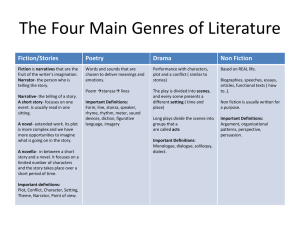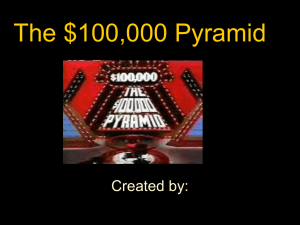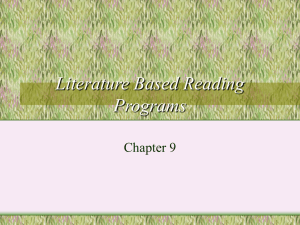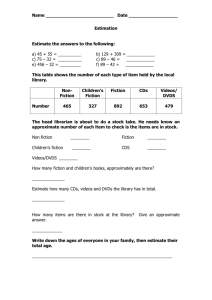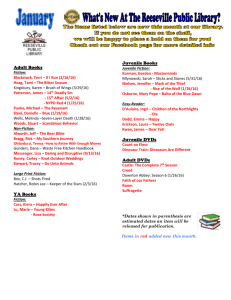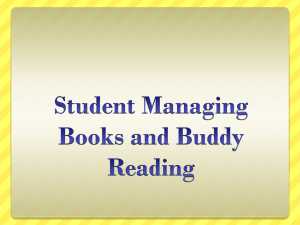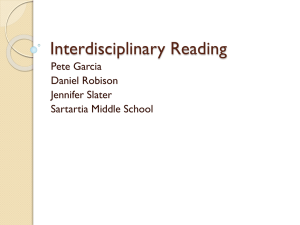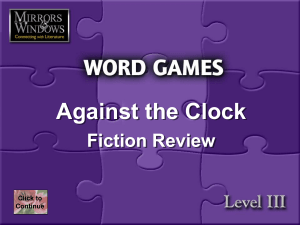The Art of Short Fiction: Character and Conflict in Miniature
advertisement
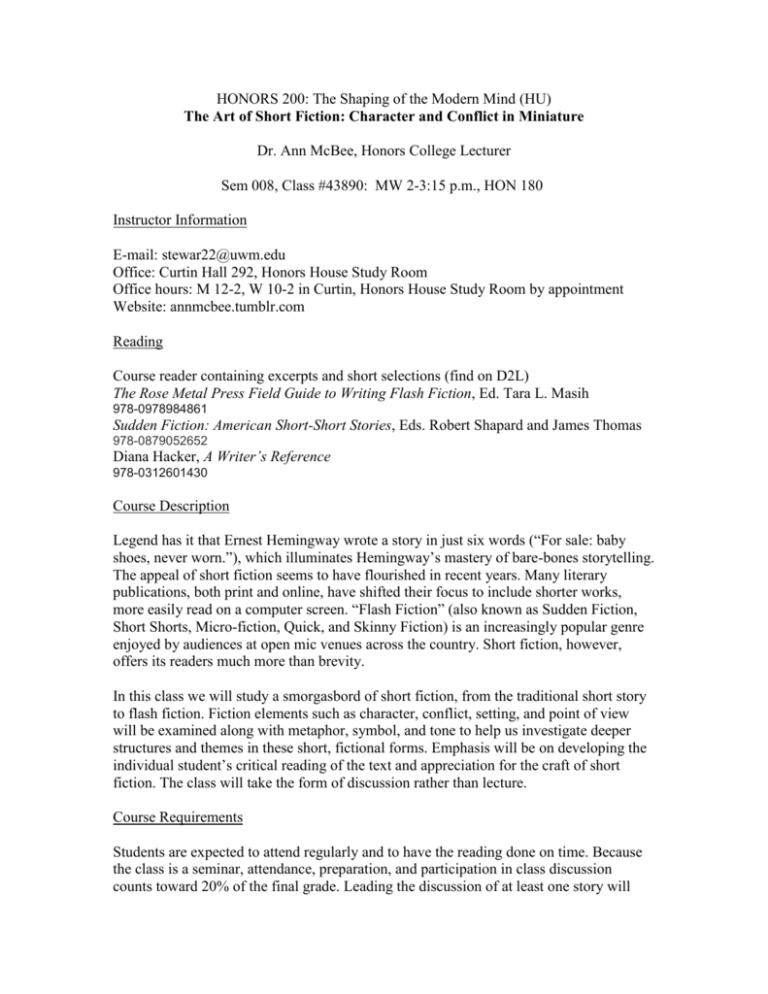
HONORS 200: The Shaping of the Modern Mind (HU) The Art of Short Fiction: Character and Conflict in Miniature Dr. Ann McBee, Honors College Lecturer Sem 008, Class #43890: MW 2-3:15 p.m., HON 180 Instructor Information E-mail: stewar22@uwm.edu Office: Curtin Hall 292, Honors House Study Room Office hours: M 12-2, W 10-2 in Curtin, Honors House Study Room by appointment Website: annmcbee.tumblr.com Reading Course reader containing excerpts and short selections (find on D2L) The Rose Metal Press Field Guide to Writing Flash Fiction, Ed. Tara L. Masih 978-0978984861 Sudden Fiction: American Short-Short Stories, Eds. Robert Shapard and James Thomas 978-0879052652 Diana Hacker, A Writer’s Reference 978-0312601430 Course Description Legend has it that Ernest Hemingway wrote a story in just six words (“For sale: baby shoes, never worn.”), which illuminates Hemingway’s mastery of bare-bones storytelling. The appeal of short fiction seems to have flourished in recent years. Many literary publications, both print and online, have shifted their focus to include shorter works, more easily read on a computer screen. “Flash Fiction” (also known as Sudden Fiction, Short Shorts, Micro-fiction, Quick, and Skinny Fiction) is an increasingly popular genre enjoyed by audiences at open mic venues across the country. Short fiction, however, offers its readers much more than brevity. In this class we will study a smorgasbord of short fiction, from the traditional short story to flash fiction. Fiction elements such as character, conflict, setting, and point of view will be examined along with metaphor, symbol, and tone to help us investigate deeper structures and themes in these short, fictional forms. Emphasis will be on developing the individual student’s critical reading of the text and appreciation for the craft of short fiction. The class will take the form of discussion rather than lecture. Course Requirements Students are expected to attend regularly and to have the reading done on time. Because the class is a seminar, attendance, preparation, and participation in class discussion counts toward 20% of the final grade. Leading the discussion of at least one story will count toward 10%. There will be frequent informal writing assignments (10%) and a series of three medium-length analytical essays, each worth 20%, all of which will be revised. The final paper has a creative option for any student who wants to write their own short story. Participation: Attendance: Students who avoid absence altogether during the semester will receive 20 full points for participation regardless of other factors. Students who accrue more than four unexcused absences will be docked 10 participation points regardless of other factors. (An excused absence requires a doctor’s note or other documentation.) Discussion/Preparation: Students are expected to be active participants in discussion, and to come to class with the required materials on time. The only way to be assured of receiving the full 20 points for participation will be to do ALL of the following: - Come to class every meeting, on time - Contribute verbally and thoughtfully to discussion at least once per meeting - Read assignments and take notes faithfully - Bring reading materials and notes to every class meeting - NEVER text or otherwise fiddle with smart phone during class time - Never leave class early or pack up to leave early unless discussed with the instructor before class - Never unnecessarily and intentionally antagonize classmates (or the instructor) - Engage in active listening (no sleeping, side conversations, etc…) Leading Discussion: Students receive 10 points for leading a discussion of the required readings. We will sign up for a discussion slot the first week of class. For this assignment, each student will compose five open-ended questions for discussion. You should have thoughts and notes prepared that address these questions, but yours won’t necessarily be the only possible reading of the text (hence, open-ended). The idea is to think about the story in your own way, and then solicit ideas from your classmates about the same story which may or may not agree with those considerations. Informal Writing Assignments: Some of these short writings will be responses to reading; others will be creative writing exercises. These will be 1-2 pages typed, double-spaced, and will not be accepted late under any circumstance. These will always be printed and brought to class in hard copy for the purpose of discussion. None of these short informal assignments will be accepted over e-mail. Analytical Essays: You will be assigned three 4-5 page essays throughout the semester. The first two will be revised. Each is worth 20 points. Late papers (a week late or less) will receive automatic half credit (10 points), and they will not receive comments. Papers will not be accepted more than one week past the due date. Essay 1: Craft Analysis (20 pts.) Analyze 1-2 short stories with regard to methods used by the author(s) such as metaphor, character, conflict, setting, and point of view. How does the author employ or experiment with narrative form? What purpose does the method serve for an audience or for a particular context? Essay 2: Defining Story (20 pts.) Examine what it means to be a story, using examples of narratives in the form of short story, prose poem, or other. What makes something a story and not a poem? What are some ways the forms overlap? What are some of the differences in the way flash fiction defines story? This essay requires citation of at least one outside scholarly source. Essay 3 (20 pts for 1 option) Option 1: Literary Analysis Analyze a work of short fiction (your choice, not necessarily a course text) according to what scholars or other writers have said with regards to craft, theory, or literary tradition. This essay requires citation of at least two outside scholarly sources. Option 2: Fiction Piece or Collection Write one or more short works of fiction, revising work you’ve done in class. This version of the assignment will be graded according to elements of craft we discuss. It must have a well-structured plot, well-developed character, clear sense of time and place, balance of summary and scene, and make use of imagery and language choices that support the writer’s purpose. It must avoid cliché and one-dimensional character. Due dates for first drafts of all essays are listed below. Revisions are due May 13. EXTRA CREDIT OPTION: For a full five points of extra credit, attend a live reading of fiction either on campus or locally. I will inform you when some of these are scheduled, but you are encouraged to look into possibilities on your own. To earn your points, you will write a 100-word response to this reading that talks about the content of the reading, the story-telling style of the author, and/or what you learned from the author about fiction or narrative. Public reading is part of the writing life, and the oral tradition is part of the history of storytelling. Hint: GO AS EARLY AS POSSIBLE. Readings may come to end before late in the semester, and any extra credit is due the last day of class (May 6). Syllabus Addendum (FYI): Students with disabilities. http://www4.uwm.edu/sac/SACltr.pdf Religious observances. http://www4.uwm.edu/secu/docs/other/S1.5.htm Students called to active military duty. http://www4.uwm.edu/current_students/military_call_up.cfm Discriminatory conduct (such as sexual harassment). Discriminatory conduct will not be tolerated by the University. It poisons the work and learning environment of the University and threatens the careers, educational experience, and well-being of students, faculty, and staff. http://www4.uwm.edu/secu/docs/other/S47.pdf Academic misconduct. Cheating on exams or plagiarism are violations of the academic honor code and carry severe sanctions, including failing a course or even suspension or dismissal from the University. http://www4.uwm.edu/acad_aff/policy/academicmisconduct.cfm Complaint procedures. Students may direct complaints to the head of the academic unit or department in which the complaint occurs. If the complaint allegedly violates a specific university policy, it may be directed to the head of the department or academic unit in which the complaint occurred or to the appropriate university office responsible for enforcing the policy. http://www4.uwm.edu/secu/docs/other/S49.7.htm Grade appeal procedures. A student may appeal a grade on the grounds that it is based on a capricious or arbitrary decision of the course instructor. Such an appeal shall follow the established procedures adopted by the department, college, or school in which the course resides or in the case of graduate students, the Graduate School. These procedures are available in writing from the respective department chairperson or the Academic Dean of the College/School. http://www4.uwm.edu/secu/docs/other/S28.htm As the UW System assumes “that study leading to one semester credit represents an investment of time by the average student of not fewer than 48 hours” (UWS ACPS 4), a 3-credit course such as this one will require a minimum of 144 (3 x 48) hours of your time. You may find it necessary to spend additional time on a course; the numbers below only indicate that the course will not require any less of your time. 37.5 hours in the classroom 75 hours preparing for class 31.5 hours preparing for and writing major papers Class Schedule: (subject to change) 1/26: syllabus and introductions, samples from Ploughshares Reading (Long Stories): Tillie Olson, “Tell Me a Riddle” and Charlotte Perkins Gilman, “The Yellow Wallpaper” 1/28: Discussion: comparing long work to short work featured shorts from lit mags Reading (early shorts): Edgar Allan Poe, “The Tell-tale Heart”; Nathaniel Hawthorne, “Young Goodman Brown” 2/2: student-led discussion on stories (1) Writing Assignment: Why are some stories classics? Why are so many short story writers American? Why is horror so popular when our republic was young? What other contexts are at work here? 2/4: Discussion: rhetorical situation and the short story Assigned Reading (classic shorts): Flannery O’Connor, “A Good Man is Hard to Find,” Sandra Cisneros, “Women Hollering Creek,” Tobias Wolff, “Bullet in the Brain,” and James Baldwin, “Sonny’s Blues” 2/9: student-led discussion on stories (2) Reading Assignment (world writers): Patrick Chamoiseau, “The Old Man Slave and the Mastiff,” Colum McCann, “Everything in this Country Must,” Bharati Mukherjee, “The Management of Grief,” Ngugi wa Thiong’o, “Minutes of Glory” 2/11: student-lead discussion on stories (2) Writing Assignment: Respond to one of the stories we’ve read: What was the writer trying to do to his/her audience? What is the story “about”? What are some differences between this story and at least one other in terms of language, character, and narrative structure? Why do these different methods work for the writer’s story? 2/16: Discussion: sharing writings First Essay Assignment (draft due March 4) Featured (very shorts): Jamaica Kincaid, “Girl”; Rick Moody, “Boys” Reading: Introduction: In Pursuit of the Short Short Story (in Rose Metal Guide), Robert Coover, “A Sudden Story” and Introduction & Afterwords (in Sudden Fiction) 2/18: discuss readings Reading, from Sudden Fiction: (in class) “Popular Mechanics,” “Sunday at the Zoo” (homework) “Pygmalion,” “No One’s a Mystery,” “A Walled Garden,” “The Hit Man,” “A Questionnaire for Rudolph Gordon” and “Reunion” 2/23: student led discussion on readings (3) 2/25: student-led discussion continued featured shorts from lit mags Reading, from Sudden Fiction: (in class) “Reading the Paper,” “Rosary” (homework) “Children of Strikers,” “Class Notes,” “The Personal Touch,” “The Socks,” “Any Minute Mom Should Come Blasting Through the Door,” “The Quail” 3/2: student-led discussion on stories (3) 3/4: Workshops: Essay One 3/9: Workshops: Essay One 3/11: Workshops: Essay One Reading (in Rose Metal Guide): “That ‘V’ Word,” “The Myth-ing Link…” “Great Thoughts” “Titled: The Title…” “Smart Surprise in Flash Fiction” “Staying True to the Image” “A Short Short Theory” “Getting the Lead Out…” and “Flash Fiction, Prose Poetry, and Men Jumping Out of Windows…” Writing Assignment: Respond to the readings…what was interesting, surprising, confusing? At the bottom of the page, write three questions for discussion that address what caught your attention in the reading. Prepare to discuss it after the break. 3/16-18: SPRING BREAK 3/23: Discussion: reading, defining story Featured: lit mag samples Second Essay Assignment (draft due April 8) Reading Assignment: Stuart Dybek, “Gold Coast” and “The Flu” Michael Martone, “The Mayor of the Sister City…,” “Dish Night,” and “Diagnostic Drift” Robert Olen Butler, “Seven Pieces of Severance” and Steve Almond, “Moscow” and “Rumors of Myself” 3/25: student-led discussion on stories (4) 3/30: student-led discussions continued Writing Assignment: Choose one of the very short stories we’ve and analyze it in terms the way the authors in Sudden Fiction talk about the short-short story. How does this author seem to define story? How is it the similar and different from a poem? 4/1: Sharing writings 4/6: featured: prose poetry 4/8: Workshops: Essay Two Third Essay Assignment: Due May 6 4/13: Workshops: Essay Two 4/15: Workshops: Essay Two Reading: TBA 4/20-22: In-class Writing: Creative Exercises Scholars on stories discussion Reading Assignment TBA 4/27-9: In-class Writing: Creative Exercises Scholars on stories discussion Reading Assignment TBA 5/4-6: In-class Writing: Creative Exercises Scholars on stories discussion Revisions of essays due in dropbox 5/13 Sign Up to Lead Discussion: February 2: (Edgar Allan Poe, “The Tell-tale Heart” and Nathaniel Hawthorne, “Young Goodman Brown”) 1) February 9: (Flannery O’Connor, “A Good Man is Hard to Find,” and Sandra Cisneros, “Women Hollering Creek” ) 1) (Tobias Wolff, “Bullet in the Brain,” and James Baldwin, “Sonny’s Blues”) 2) February 11: (Patrick Chamoiseau, “The Old Man Slave and the Mastiff,” Colum McCann, “Everything in this Country Must”) 1) (Bharati Mukherjee, “The Management of Grief,” Ngugi wa Thiong’o, “Minutes of Glory”) 2) February 23: (“Pygmalion” and “No One’s a Mystery”) 1) (“A Walled Garden” and “The Hit Man”) 2) (“A Questionnaire for Rudolph Gordon” and “Reunion”) 3) March 2: (“Children of Strikers” and “Class Notes”) 1) (“The Personal Touch” and “The Socks”) 2) (“Any Minute Mom Should Come Blasting Through the Door” and “The Quail”) 3) March 25: (Stuart Dybek, “Gold Coast” and “The Flu”) 1) (Michael Martone, “The Mayor of the Sister City…” and “Dish Night”) 2) (Robert Olen Butler, “Seven Pieces of Severance” and Michael Martone, “Diagnostic Drift”) 3) Steve Almond, “Moscow” and “Rumors of Myself” 4)


